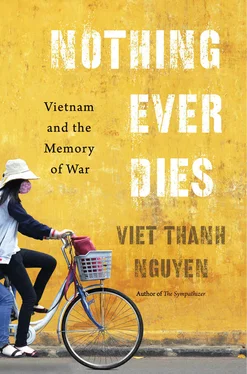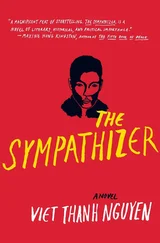Thus, the Pentagon’s war of attrition in Vietnam was matched by Hollywood’s Apocalypse Now and its entire celluloid campaign to refight the Vietnam War on global movie screens. This campaign foreshadows how the “shock and awe” of U.S. bombing during the Gulf War was equaled by the spectacular quality of American media coverage with its global saturation. The American wars in Iraq and Afghanistan have begun to receive the same propagandistic treatment, if the success of films such as Zero Dark Thirty and American Sniper are any indication. Zero Dark Thirty views CIA torture and the killing of Osama Bin Laden through the eyes of a CIA agent, encouraging the viewer to empathize with the CIA, while American Sniper is about a soldier who killed 160 Iraqis, an experience seen not only through his eyes but through the scope of his rifle. No matter the horrors that Americans may see on their screens — the beheadings, the suicide bombings, the mass executions, the waves of refugees, the drone’s eye view of war — the viewers who are not physically present at those events are anesthetized into resignation, into watching the news as an awful form of entertainment. This, too, is the “society of the spectacle” of which theorist Guy Debord spoke, a society in which all horror is revealed and nothing is done on the part of the average citizen to resist it.
If we look at a spectacular war movie such as American Sniper in isolation, it appears to be a part of a memory industry, but if we look at that movie as a part of Hollywood, and Hollywood as a component of the military-industrial complex, then we see an industry of memory in operation. The ultimate goal of this industry is to reproduce power and inequality, as well as to fulfill the needs of the war machine. 19The technologies of warfare and memory depend on the same military-industrial complex, one intent on seizing every advantage against present and future enemies who also seek to control the territory of memory and forgetting. But a military-industrial complex does so not simply or only through a memory industry based on the selling of baubles, vacations, heritages, or entertainment. The memory industry produces kitsch, sentimentality, and spectacle, but industries of memory exploit memory as a strategic resource. Recognizing that the memory industry is only one aspect of an industry of memory enables us to see that memories are not simply images we experience as individuals, but are mass-produced fantasies we share with one another. Memories are not only collected or collective, they are also corporate and capitalist. Memories are signs and products of power, and in turn, they service power. Furthermore, just as countries and peoples are not economically at the same level, neither are their memories. As Barbie Zelizer notes, “everyone participates in the production of memory, though not equally.” 20One sign of this inequality is that while the United States lost the war in fact, it won the war in memory on most of the world’s cultural fronts outside of Vietnam, dominating as it does moviemaking, book publishing, fine art, and the production of historical archives.
But even identifying the sites of industrial memory is not enough to show how the strong industries of strong countries will find more receptive audiences and consumers than the weak industries of weak countries will. Language itself becomes a circuit through which industrial memories circulate, so that English-language products are more accessible than Vietnamese ones, or at least much more likely to be translated, while American memories are varnished with a kind of coolness that Vietnamese memories do not yet possess. Even Korean memories of the war — South Korea having been America’s most important ally — travel more fluidly on the international circuitry of commodification and desirability. Vietnam, Laos, and Cambodia are much weaker powers, and as a result, their memories usually have, at best, local and national distribution and impact. When those weaker memories are exported internationally, it is almost always on art circuits that have limited reach, or in the closed worlds of diasporic and exilic communities. Those communities cannot amplify the memories of their homelands, for when they produce memories in their adopted countries, the memories remain mostly invisible, inaudible, and illegible to those outside the communities. So it is that in a shooting war’s mnemonic sequel, smaller nations and weaker peoples are outmatched because the aftermath is not fought only on their territory, where they have some advantages, but throughout the world, where they have many disadvantages.
By drawing attention to how industrial power exploits remembrance, a project such as this does not simply add even more memories to the surfeit of memories. This surfeit occurs often for traumatic events, and it happens not because the past has been worked through too much but because the past has not been worked through enough. A just memory suggests that we must work through the past or else be condemned to act out because of it, as Freud says. 21But while this is true enough, it is also still not enough. Only sometimes can the past be worked out solely through therapy or individual effort, since the conditions of the past are often beyond the individual, as is the case with war. Given the scale of so many historical traumas, it can only be the case that for many survivors, witnesses, and inheritors, the past can only be worked through together, in collectivity and community, in struggle and solidarity. This effort of a mass approach to memory should involve a confrontation with the present as much as the past, for it is today’s material inequalities that help to shape mnemonic inequities.
While revolutions in memory are thus not possible without revolutions in other aspects of social, economic, and political life, and vice versa, some scholars have argued that if we remember too much, we will be mired in the past, unable to move forward. Remembering too much, or remembering the wrong things, is supposedly part of an identity politics, a negative politics motivated by a feeling of victimization, or so the critics claim. For these scholars, identity politics encourages people to believe that they are members of a persecuted group rather than individuals, which incites them to resurrect old histories of grief and resentment that divide a nation from within or separate it from its neighbors. Undermining the nation’s identity, identity politics supposedly diverts us from real politics, the kind concerned with economy and class, money and mobility, the things that matter for people, country, and nation. 22But those who insist that we should forget the past and focus on economic and class inequality do not see that inequality cannot be addressed without a just memory. 23This kind of memory recognizes that nationalism is the most powerful form of identity politics, armed to the teeth and eager to harness all the nation’s resources for war, including memory and the dead.
A just memory opposes this kind of identity politics by recalling the weak, the subjugated, the different, the enemy, and the forgotten. A just memory says that ethically recalling our own is not enough to work through the past, and neither is the less common phenomenon of ethically recalling others. Both ethical approaches are needed, as well as an ethical relationship to forgetting, since forgetting is inevitable. All individuals and groups are invested in strategic forgetting, and we must forget if we are to remember and to live. 24A just memory constantly tries to recall what might be forgotten, accidentally or deliberately, through self-serving interests, the debilitating effects of trauma, or the distraction offered by excessively remembering something else, such as the heroism of the nation’s soldiers. These excessive memories do not point to a just approach to the past, but to an unjust one, defined by what philosopher Paul Ricoeur calls “memory abusively summoned” by those in power. 25
Читать дальше












